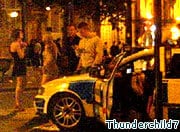Police officers in England have criticised 24-hour alcohol licensing, according to a new study showing that more than half of police time is spent dealing with drink-related crime.
The Institute of Alcohol Studies’ (IAS) survey of 4,022 police officers found that more than three-quarters (76 per cent) had been injured while dealing with drunk people, and 65 per cent were injured on multiple occasions.
More than 40 per cent of police officers had been sexually harassed or sexually assaulted by drunk people while they were on duty.
Unnecessary burden
The IAS also surveyed close to 400 members of the ambulance service, 89 per cent of whom felt that dealing with alcohol-related callouts places an unnecessary burden on time and resources.
Close to all (96 per cent) of the ambulance staff said they have been threatened or verbally abused by an apparently drunk person whilst on duty.
More than two-thirds (68 per cent) of the police officers surveyed said the cause of alcohol-related crime was the introduction of 24-hour licensing in 2005.
Fallout
Labour introduced 24-hour drinking amid hopes that the new laws would create a continental style ‘café-culture’ in the UK.
But a sergeant was quoted in the survey as saying that the move had changed policing forever, as the majority of police time was now spent “dealing with the fallout from the night time economy”.
He said they are no longer able to patrol residential areas to catch burglars.
Increasing workload
Katherine Brown, Director of the Institute of Alcohol Studies, said: “Our report shows how alcohol takes up a disproportionate share of emergency service time, costing taxpayers billions of pounds each year.
“Many of these incidents are preventable, and alcohol therefore creates unnecessary problems for front line staff, increasing their workload and preventing them from dealing with other important issues.”
Brown said: “We call on the government to better support our emergency services and implement policies to ease this burden, such as minimum unit pricing for alcohol.”

